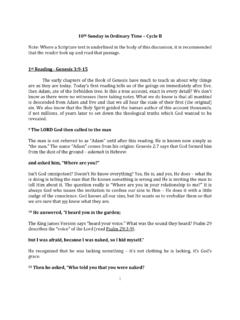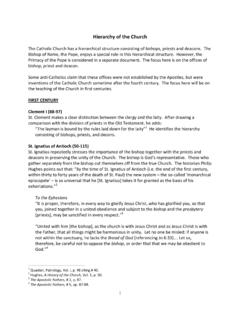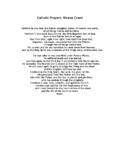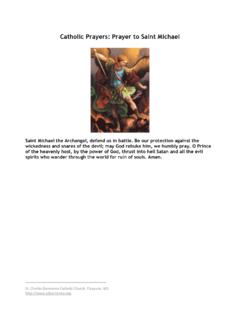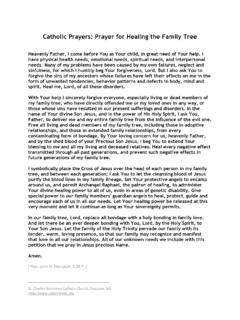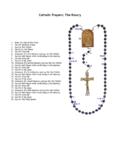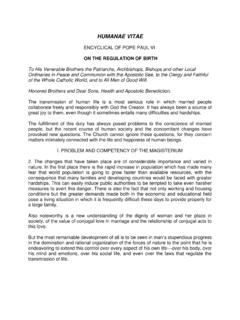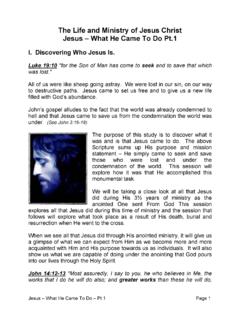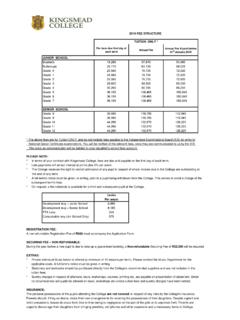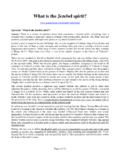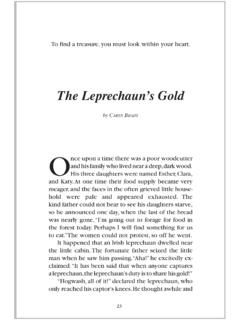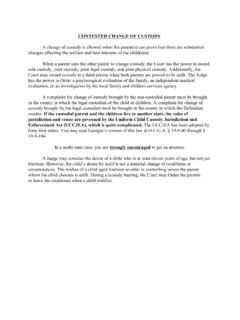Transcription of The Canaanite Woman - Charles Borromeo
1 1 The Canaanite Woman A Lesson on Faith and Humility In chapters 14 through 18, St. Matthew focuses on important instruction Jesus gives to Peter and the apostles, and through them to us. One particular incident that captures my attention is the story of the Canaanite Woman (Mt 15:21-28). As the narrative unfolds, a pagan, a Canaanite Woman , a non-Jew, a goy, shouts to Jesus with the urgent plea: Kyrie, eleison Lord, have mercy on me. Then she adds, my daughter is severely possessed by a demon (15:22). But Jesus responds with ominous silence! When the apostles asked Jesus to send her away because she kept crying after them, he replied coolly: I was sent only to the lost sheep of the house of Israel (15:24). Then the Canaanite Woman knelt before Jesus pleading, Lord, help me (15:25). Jesus answered in words that seem degrading, It is not fair to take the children s bread and throw it to the dogs (15:26).
2 The Greek word, kunarion, rendered in our text as dogs, refers to little housedogs. Let s interject ourselves into the story. How would you feel if someone implied that you and your little girl were worthless pagan dogs? However, notice the remarkable response of this amazingly humble Woman . She agreed with Jesus assessment without defensiveness while continuing her plea. Yes, Lord, yet even the dogs eat the crumbs that fall from their master s table (15:27). She fully accepted the reality of their situation. She was not in covenant with God as part of his chosen people. Earlier she identified Jesus as the Son of David, (15:24) thereby expressing her faith in Jesus as the Jewish Messiah. Therefore, she and her daughter are aptly called little dogs in relationship to the creator of heaven and earth. She will gladly accept a role for herself and her daughter as house pets in the palace of the King of Kings.
3 She will be delighted and grateful if they can eat the crumbs from his table. When I reflect on the response of this surprising Woman , I think of our little dog, Georgia. Georgia came to us unexpectedly one day with her head down and her tail wagging. She was so docile and humble that she captured every heart in the family. This is how Jesus responds when He is approached with humility. The exclamation O only occurred five times in all four Gospels. They always come from the mouth of Jesus. In one instance Jesus gave a mild rebuke to the disciples on the way to Emmaus: O foolish men, and slow of heart to believe (Lk 14:25). On three other occasions they punctuated strong condemnations (Mt 17:17; Mk 9:19; Lk 9:41). However, in the case of this Canaanite women, O was exclusively used to introduce Jesus admiration. O Woman , great is your faith! Be it done for you as you desire (15:28). Two thousand years later we remember her as the Woman of great faith and admirable humility.
4 2 Additional insight is gained by reflecting on Jesus use of the word, Woman (15:28). Jesus twice identified his own mother as Woman , first at Cana when he began his formal assault on the kingdom of Satan, and finally on Calvary where he consummated his victory. By so doing Jesus identified his mother with the Woman of Genesis 3:15, and with the queen mother (Revelation 12:1-2, 4-5,17) whose seed will crush the serpent s head. Jesus address of the Canaanite mother as Woman connected her with Mary, the prophecy of Genesis and the revelation of the Apocalypse. This may seem surprising until one recalls another familiar incident. Matthew reported that someone told Jesus, Your mother and your brothers are standing outside, asking to speak with you. But Jesus said in reply: Who is my mother? Who are my brothers? And stretching out his hand toward his disciples, he said, Here are my mother and my brothers.
5 For whoever does the will of my heavenly Father is my brother, and sister, and mother (Mt 12:47-50). The humble surrender of this pagan Woman to the obedience of faith (Rom 1:5; 16:26) incorporated her into Jesus covenant family. She was no longer a dog eating the scraps from the Master s table. She was now the Father s daughter who was invited to dine at the wedding banquet of the Lamb. How do we view ourselves? Are we someone of importance? Do we crave approval and recognition? Or do we admit that we are little dogs who God has elevated to the awesome destiny of being his sons and daughters, a vocation that we could never deserve. St. Augustine gave a powerful instruction on the importance of humility. I wish you to prepare for yourself no other way of seizing and holding the truth than that which has been prepared by Him who, as God, saw the weaknesses of our goings. In that way the first part is humility; the second, humility; the third, humility: and this I continue to repeat as often as you might ask direction, not that there are no other instructions which may be given, but because, unless humility proceed, accompany and follow every good action which we perform being at once the object which we keep before our eyes, the support to which we cling, and the monitor by which we are restrained, pride wrests wholly from our hand any good work on which we are congratulating ourselves.
6 The great Spanish mystic and director of souls, St. John of the Cross also wrote about humility: God falls in love with the soul not because his eyes are attracted to her greatness, but to the greatness of her humility. Humility is based on truth. It begins with the recognition of God s infinite grandeur and holiness on the one hand, and our weakness, ineptitude, and sinfulness on the other. No matter how lofty the creature, the abyss between that person and God is infinite. Humility is the recognition of that infinite chasm. Then when we reflect of Jesus humility, we quickly discover how far we are from being truly humble. The greatest of the saints are the most humble, but Jesus is more humble than all the saints. So it is 3 that Jesus instructed us: Take my yoke upon you and learn from me, for I am meek and humble of heart (Mt 11:29). Saint Charles Borromeo Catholic Church, Picayune, MS Reposted with permission of James Seghers and Totus Tuus Ministries All Rights Reserved
